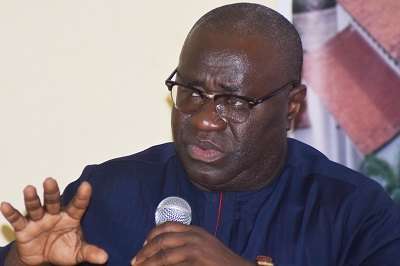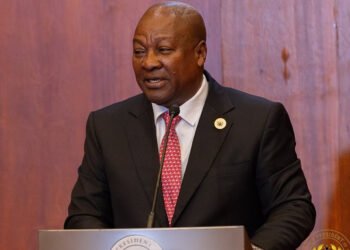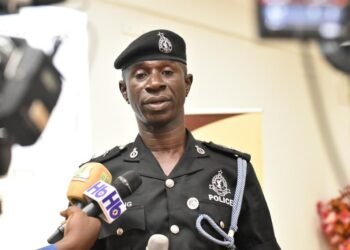A renowned security consultant Professor Kwesi Anning, has lauded the role of Ghana’s Armed Forces in security intelligence in geopolitics.
He provided a comprehensive analysis of Ghana’s stance on governance and democracy in the face of regional instability, particularly in Burkina Faso. He reaffirmed;
“The type of governance that we had in Ghana could only continue and was not robbed because we have an armed forces that is highly educated, very nuanced in understanding the politics of the country, and the conviction that the power of the thumb is greater than the gun.”
Professor Kwesi Anning Security Consultant
This perspective suggests that the military’s commitment to democratic principles has been pivotal in averting governance disasters in Ghana in the last 8 years.
Professor Anning commended specific individuals for their roles in mitigating potential crises. He commended the General who led the Africa Initiative Secretariat, and Hon. Kan-Daapah, the National Security Minister, for their maturity and presence of mind.
Their efforts were crucial in addressing the fallout from attempts to sell out Burkina Faso, which was seen as a diversion from Ghana’s challenges under ECOWAS leadership.
Prof. Anning did not shy away from criticizing ECOWAS leadership, particularly Ghana’s role. He pointed out the lack of sensitivity. He emphasized;
“When the second Burkinabe coup happened, there was an ECOWAS meeting in Accra. My first statement was, every single ECOWAS head of state present must then sack his intelligence chiefs.’’
Professor Kwesi Anning Security Consultant
This statement reflects his frustration with the apparent disconnect between leadership and the intelligence community, a sentiment shared by civil society and development agencies.
He cited the near-lynching of ECOWAS representatives in Burkina Faso as a manifestation of this discontent.
“There is this upsurge of youth agency and an anger that we have a democratic set of political leaders who have lost touch with the reality on the subject.’’
Professor Kwesi Anning Security Consultant
According to him, this anger is part of a broader regional trend where countries like Niger, Mali, and Chad are pushing back against French influence, signaling a shift in regional dynamics.
However, Reflecting on Former President Nana Akufo-Addo’s tenure, Mr. Anning recalled his bold stance against French dominance in Africa. He recounted;
“When President Akufo-Addo, in the heyday his early role, spoke to the French president and told him to his face that he was moving Ghana beyond aid, the whole of the African continent said yes, that is the man.”
Professor Kwesi Anning Security Consultant
However, he questioned the sincerity of this political posture, suggesting it might have been a strategic move rather than a genuine commitment to change.
Mr. Anning emphasized the need for a reassessment of leadership within ECOWAS and Africa at large.

He referenced the calls for reassessment made by leaders in light of the complex challenges facing the region.
“The notion of reassessment is very key because Mahama speaks about the rising blood star. President Tinubu says I will walk with you. President Tinubu realized that any drive to deepen Nigeria’s hegemony would need Ghana’s consistent and unflinching support.”
Professor Kwesi Anning Security Consultant
Regional Self-Determination and Economic Ties
Moreover, the security consultant praised the efforts of regional leaders like Traore in Niger and Mali, who have taken a firm stance against French military presence.
He also highlighted the longstanding economic ties within the region, such as the trade routes and commodities exchanged between countries like Ghana, Burkina Faso, and Mali.
Professor Kwesi Anning’s analysis provides a nuanced understanding of Ghana’s role in regional governance and security.
His emphasis on the educated armed forces, the critical roles of key figures, and the need for leadership reassessment highlights the multifaceted challenges and opportunities in West Africa.
As the region grapples with coups, youth agencies, and external influences, Ghana’s approach, as outlined by Anning, offers valuable insights into navigating these complexities.
READ ALSO; PFAG Congratulates President Mahama, Calls for Key Agricultural Reforms






















